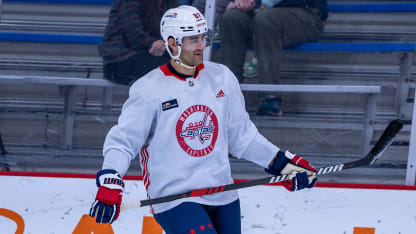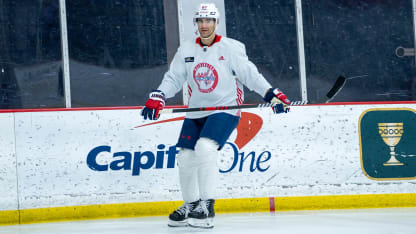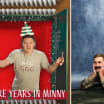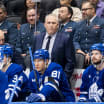ARLINGTON, Va. -- Max Pacioretty thought he might have to retire after tearing his right Achilles tendon for the second time last season, but the forward believes he will be able to return to play for the Washington Capitals this season.
“I feel like we have a really good grasp as to what happened in the past and what we need to do in the present and the future for me to continue my career,” Pacioretty said Tuesday. “I do know that I have a lot of hockey left in me. There was a time where maybe I wasn't as confident in that, a time where I didn’t know if I’d play hockey ever again, but I'm coming to the rink every day thinking that this could be my last day here and just enjoying it.”
Although when Pacioretty will play remains to be determined, the 34-year-old has been making progress in his recovery, including skating three times in the past two weeks. He had not been on the ice previously since tearing his Achilles for the second time when playing for the Carolina Hurricanes against the Minnesota Wild on Jan. 19.
“I feel like I'm getting my life back,” Pacioretty said. “I’ve only skated three times, but this is what I was born to do so it feels like some normalcy in my life, and definitely have much more of a smile on my face now that I'm skating.”
Pacioretty, who signed a one-year, $2 million contract (with an additional $2 million in performance-based incentives) with the Capitals on July 1, initially tore his Achilles during offseason training and underwent surgery to repair it Aug. 10, 2022, after being traded to the Hurricanes by the Vegas Golden Knights on July 13, 2022.
He returned Jan. 5 of last season against the Nashville Predators and scored three goals in five games before tearing it again.
After that, Pacioretty traveled the world seeking answers, including going to Turku, Finland, to have surgery Jan. 25.
“I've been to Finland, Germany, places in Canada, different places in the States,” Pacioretty said. “I’ve seen a lot of people and a lot of what people would call the best in the world. A lot of opinions, but I think we painted a pretty clear picture now as to what I need to do to get back to being myself.”
Pacioretty believes his Achilles problems stemmed from playing through previous injuries.
“I dealt with two broken feet in two years, and I think that's when this really all started to happen,” he said. “… But in terms of all of that and working on my body, I feel like we're in a good place right now and I feel like the team has been really open to me seeing a lot of people and trying to find answers and they helped a lot with that as well, and I think we're doing a really good job of trying to make sure I come back and I try and stay healthy.”
Capitals general manager Brian MacLellan said Monday that Pacioretty has a set schedule and is limited in how many times he can skate.
Pacioretty said he’s unsure when he can start skating more often and increase the intensity of his workouts.
“A lot of that is out of my hands,” he said. “Really taking it one skate and one day at a time. Good news is I've responded well to being out there and whether that means we ramp things up quickly or slowly, that's kind of out of my control. So I'm just listening to what I'm being told in terms of that while giving feedback with how I feel, and the only thing I can say, the good news, is that I've responded really well to everything up to this point.”
Pacioretty said he has a couple dates on the calendar, “circled in pencil,” for when he’d like to play his first game this season but hasn’t shared them with anyone outside his family. He has 645 points (326 goals, 319 assists) in 855 regular-season games in 15 NHL seasons, including six seasons when he scored at least 30 goals.
He believes he has plenty left to help the Capitals whenever he’s ready to play.
“There was a good, solid two, three months where I was ready to stop playing,” he said. “I’ve spent a good portion of the last year in bed, not being able to do things with my family and my kids, travel to their hockey tournaments, stuff like that. And for me, that was really difficult. But when I do look at the situation and my kids and my family, I don't want to ever say that I gave up on something that I could have continued doing. It's important for me to do this for myself but also for my family and my kids to kind of show them that we can get through this together.
“I know I have so much more hockey in the tank. I'm a different person when I'm out there skating, even if it's for 15 minutes without pucks. This is what I was born to do, and I want to do this as long as I can.”




















